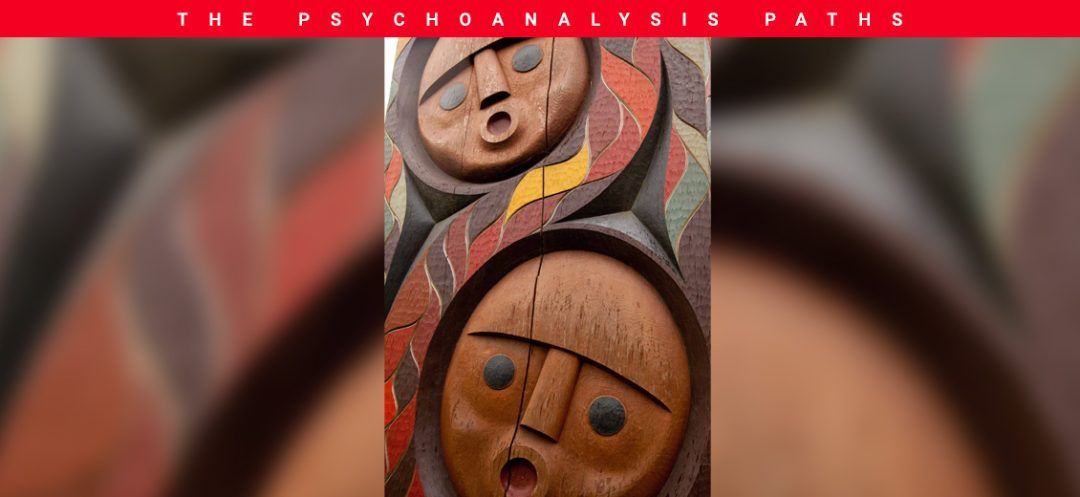
Listen to the article
[audio mp3="https://thisisbeirut.com.lb/wp-content/uploads/2024/05/Every-week-we-invite-you-to-explore-a-striking-quote-from-a-great-psychoanalyst-to-reveal-its-1.mp3"][/audio]
Every week, we invite you to explore a striking quote from a great psychoanalyst to reveal its depth and richness. These lapidary, often provocative, formulas open up new perspectives on the intricacies of the human psyche. By deciphering these quotes with rigor and pedagogy, we invite you on a fascinating journey to the heart of psychoanalytic thought to better understand our desires, anxieties and relationships with others. Ready to dive into the deep waters of the unconscious?
This quote by Sigmund Freud is taken from his book Totem and Taboo, published in 1913. It summarizes, perhaps shockingly for some readers, the complex and often conflicting dynamics that underlie family relationships, both within the couple itself and in their relations with their children.
In Totem and Taboo, Freud develops the myth of the father of the primal horde, a sort of despot who monopolizes power and all the women of the tribe. His sons, jealous, envious and fed up, rebel and kill him. Overcome by a powerful sense of guilt, they then elevate the father to a totem and establish a new social structure based on three taboos: murder, incest and cannibalism, renouncing their homicidal and incestuous desires and condemning any repetition of these crimes. These taboos will constitute the essential foundations of any civilization and notably that of the family structure: they mark the birth of culture, religion and moral conscience.
During their psychosexual development, the child will unconsciously recapitulate and fantasize about this same myth during the Oedipal period. In its positive version, the child desires the death of the parent of the same sex (the father for boys, the mother for girls) and harbors loving feelings for the parent of the opposite sex. In its negative form, these feelings are reversed: love for the parent of the same sex and hatred for the parent of the opposite sex. With the resolution of the Oedipus complex, the child will internalize the same taboos established by the sons of the primal horde father, if all goes well.
This period highlights the ambivalence of all human affectivity, which is present in the infant from birth: love and hatred closely accompany each other, tied to the life and death drives. This ambivalence is particularly visible during the Oedipal stage, during which the child experiences both love and death wishes towards the same parent.
Human relationships will be characterized by the difficulty of reconciling these antagonistic desires, not only as they manifest during the Oedipus period, but also as they replay throughout our adult life, notably in our emotional and romantic relationships. We often relive with our partner’s feelings that bring us back to our parental relationships, reflecting unresolved Oedipal conflicts. The Lebanese family structure, and more broadly the Middle Eastern one, often illustrates this.
At the risk, once again, of disturbing some, it must be recognized that the family, idealized as a cocoon of love, understanding and security, can sometimes prove to be a theater of violent struggles, psychological or physical, where childhood conflicts are replayed. Thus, the desire for murder can be found in the parents themselves, expressed both in their couple relationship and towards their children. In the couple relationship, for example, these feelings can manifest as rivalries, identity confusion, jealousy, hatred and power struggles. They often reflect repressed desires and antagonisms whose roots may lie in their own past childhood experiences. Similarly, towards their children, parents can experience ambivalent feelings, oscillating between love and hatred, the desire for protection and feelings of frustration or rejection, which can sometimes take violent, psychological and physical forms.
Disputes, resentments, aggressiveness, controlling behaviors and insidious intra-family power struggles are all manifestations of repressed hatred. Domestic violence, for example, is the work of the death drive and can be understood, paradoxically, as a destructive behavior where one partner saves themselves by destroying the other.
The same applies between siblings, where life drives manifest as feelings of love, solidarity and mutual aid, while death drives express through feelings of rivalry, jealousy, hatred and a desire for murder.
Psychoanalytic clinical practice has highlighted the devastating effects of family violence on children’s psychophysical development. The traumas suffered in childhood will manifest later as psychological or psychopathological disorders and significant relational difficulties. The repetition of these experienced intra-family violences is highly likely to occur in adulthood, in the couple’s life or when founding a new family, for example.
This “murder” Freud speaks of will not often externalize as a physical act. Fortunately! It is rather a symbolic process by which we learn to renounce certain desires and drives to be part of the human community. The taboos and limits we must impose on ourselves shape our individual as well as socio-cultural behavior, which can only favor the advent of individuation.
Psychoanalysis also proposes a reality that is difficult to accept in some of our cultural contexts: one only becomes an adult through this symbolic murder. It is a psychic process leading to personal transformation: the rupture with childhood and separation from Oedipal attachments. It is the rejection of certain beliefs or behaviors endured, it is the acceptance of a structural lack from which desire can emerge. This process can only be accomplished through a symbolic violence that one must go through and which will not be without suffering, if one wishes to become a subject.
The internalization of symbolic castration, as indispensable as it is, will nonetheless remain a source of inner conflicts, a permanent struggle between love and hatred, between Eros and Thanatos.
[audio mp3="https://thisisbeirut.com.lb/wp-content/uploads/2024/05/Every-week-we-invite-you-to-explore-a-striking-quote-from-a-great-psychoanalyst-to-reveal-its-1.mp3"][/audio]
Every week, we invite you to explore a striking quote from a great psychoanalyst to reveal its depth and richness. These lapidary, often provocative, formulas open up new perspectives on the intricacies of the human psyche. By deciphering these quotes with rigor and pedagogy, we invite you on a fascinating journey to the heart of psychoanalytic thought to better understand our desires, anxieties and relationships with others. Ready to dive into the deep waters of the unconscious?
This quote by Sigmund Freud is taken from his book Totem and Taboo, published in 1913. It summarizes, perhaps shockingly for some readers, the complex and often conflicting dynamics that underlie family relationships, both within the couple itself and in their relations with their children.
In Totem and Taboo, Freud develops the myth of the father of the primal horde, a sort of despot who monopolizes power and all the women of the tribe. His sons, jealous, envious and fed up, rebel and kill him. Overcome by a powerful sense of guilt, they then elevate the father to a totem and establish a new social structure based on three taboos: murder, incest and cannibalism, renouncing their homicidal and incestuous desires and condemning any repetition of these crimes. These taboos will constitute the essential foundations of any civilization and notably that of the family structure: they mark the birth of culture, religion and moral conscience.
During their psychosexual development, the child will unconsciously recapitulate and fantasize about this same myth during the Oedipal period. In its positive version, the child desires the death of the parent of the same sex (the father for boys, the mother for girls) and harbors loving feelings for the parent of the opposite sex. In its negative form, these feelings are reversed: love for the parent of the same sex and hatred for the parent of the opposite sex. With the resolution of the Oedipus complex, the child will internalize the same taboos established by the sons of the primal horde father, if all goes well.
This period highlights the ambivalence of all human affectivity, which is present in the infant from birth: love and hatred closely accompany each other, tied to the life and death drives. This ambivalence is particularly visible during the Oedipal stage, during which the child experiences both love and death wishes towards the same parent.
Human relationships will be characterized by the difficulty of reconciling these antagonistic desires, not only as they manifest during the Oedipus period, but also as they replay throughout our adult life, notably in our emotional and romantic relationships. We often relive with our partner’s feelings that bring us back to our parental relationships, reflecting unresolved Oedipal conflicts. The Lebanese family structure, and more broadly the Middle Eastern one, often illustrates this.
At the risk, once again, of disturbing some, it must be recognized that the family, idealized as a cocoon of love, understanding and security, can sometimes prove to be a theater of violent struggles, psychological or physical, where childhood conflicts are replayed. Thus, the desire for murder can be found in the parents themselves, expressed both in their couple relationship and towards their children. In the couple relationship, for example, these feelings can manifest as rivalries, identity confusion, jealousy, hatred and power struggles. They often reflect repressed desires and antagonisms whose roots may lie in their own past childhood experiences. Similarly, towards their children, parents can experience ambivalent feelings, oscillating between love and hatred, the desire for protection and feelings of frustration or rejection, which can sometimes take violent, psychological and physical forms.
Disputes, resentments, aggressiveness, controlling behaviors and insidious intra-family power struggles are all manifestations of repressed hatred. Domestic violence, for example, is the work of the death drive and can be understood, paradoxically, as a destructive behavior where one partner saves themselves by destroying the other.
The same applies between siblings, where life drives manifest as feelings of love, solidarity and mutual aid, while death drives express through feelings of rivalry, jealousy, hatred and a desire for murder.
Psychoanalytic clinical practice has highlighted the devastating effects of family violence on children’s psychophysical development. The traumas suffered in childhood will manifest later as psychological or psychopathological disorders and significant relational difficulties. The repetition of these experienced intra-family violences is highly likely to occur in adulthood, in the couple’s life or when founding a new family, for example.
This “murder” Freud speaks of will not often externalize as a physical act. Fortunately! It is rather a symbolic process by which we learn to renounce certain desires and drives to be part of the human community. The taboos and limits we must impose on ourselves shape our individual as well as socio-cultural behavior, which can only favor the advent of individuation.
Psychoanalysis also proposes a reality that is difficult to accept in some of our cultural contexts: one only becomes an adult through this symbolic murder. It is a psychic process leading to personal transformation: the rupture with childhood and separation from Oedipal attachments. It is the rejection of certain beliefs or behaviors endured, it is the acceptance of a structural lack from which desire can emerge. This process can only be accomplished through a symbolic violence that one must go through and which will not be without suffering, if one wishes to become a subject.
The internalization of symbolic castration, as indispensable as it is, will nonetheless remain a source of inner conflicts, a permanent struggle between love and hatred, between Eros and Thanatos.
Read more





Comments